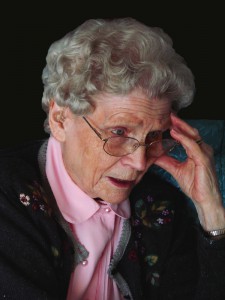Although we are parents, we are also children. The change in our parents often begins quite slowly with the odd bit of help here and there. For me, with my mother, it was some shopping from time to time. Sometimes when I came back with the shopping, she would say ”But you didn’t get mandarins!” I would grit my teeth and say very calmly, “But you didn’t have them on your list!” Also I had to be on the end of the phone when a problem arose with her TV remote or the hot water cylinder or whatever.
I also did a lot of listening to stories from long ago. My mother would forget what happened half an hour ago, but she could remember every detail of her childhood. Who lived on her road and what went on behind the drawn curtains. Occasionally there would be a gem that I hadn’t heard before, like the time she remembered that every afternoon at about 4pm a very well dressed man would come and stand outside their house. She lived alone with her mother but it was a family full of secrets, so she never asked who was that man?
And her mother never explained.
After she turned 90 I noticed quite a change. I knew she needed more help so we began at the GP. Here we found out how to get an alarm that she would wear around her neck in case she fell over and how to get an assessment from the local District Health Board.
I was there for that first assessment from the District Health Board, and when he asked her if she had any delusions – I thought it a very strange question. At that stage she answered “I always have delusions of grandeur” and we all laughed. A bit later on I knew why he had asked that question, but the problem was that when she became delusional it all seemed so real to her. She would argue with me, she remembered every 
That first assessment was very useful because she got some help with the shopping and housework, the taking of her pills and eventually meals on wheels. Also some handles to hold onto in the shower and the toilet. This stage lasted about a year.
But then the falling over stage happened and the alarm got used lots and we got rung up all hours of the night and in a dazed and slightly sick state, we would follow the ambulance into the hospital.
Each stay in the hospital was an anxious time for me because the stress of being in a ward with other elderly people made the dementia a lot worse. She would tell me that people had stolen her clothes and her handbag and that the other people were drug addicts. I just didn’t recognise her and I didn’t know if these delusions were a permanent state.
However once she got home she remembered things again and we carried on until she fell and injured her leg and that meant an operation and anaesthetic. Apparently anaesthetic is not good with a bit of dementia, so that when she went home this time she didn’t remember. I left her at 5.30 and went home. I had a bad feeling about her so I went back at about 8pm and she was still sitting in the dark and cold in exactly the same position. She just couldn’t seem to move or do anything.
My mother was then reassessed by the District Health Board, again I was present at the assessment because this time my mother’s answers were a long way from the truth. I made sure I spoke to the assessor as she was getting into her car. This time they recommended rest home care because it was clear my mother needed help day and night.
Where to go? My main criteria was that I wanted her to be near where we lived so that I could see her easily and I wanted the staff to be kind and patient. In the end I found one that was quite close and the staff, although they changed often, were really lovely and kind. Considering the pay they get, I think they are saints!
Two years on, she is still in the rest home but she is so thin, so frail and now very weak. Not once has she ever complained or accused me of putting her into the home. I thank her for that. So I have watched my sharp, witty and intelligent mother become so tired and confused and now I have to say that it is a blessing that her mind is almost completely gone. The hard part for the sons and the daughters is that our parents change, not all the time, but often, and you are left wondering where that person you knew and loved for so many years has gone?
Now we are at the stage where there is nothing to do but wait. For so long I was the one who sorted things out for my mother, but this time I am as helpless as she is. So we live each day as it comes and we wonder how it will end. Actually, we know how it will end but we just don’t know the way it will go.
– Debbie Knowles



I love your story. I’ve worked in aged care for years, and am now one of those assessors you described. Your mother is so lucky to have a caring and kind daughter – some of the client’s I assess, have no one – and it’s heart breaking because although there are a few support agencies out there, they are all limited by funding & resources. I really enjoyed reading your blog. Thanks.